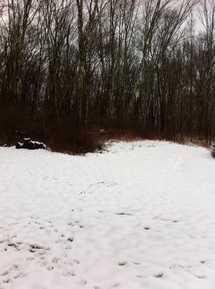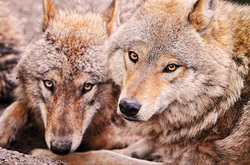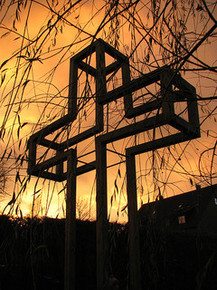 Snow in Southbury, CT / AlisonR. It was the week of Christmas and I was in Southbury, Connecticut. The temperature kept dropping; it snowed. My son and daughter-in-law didn’t want to drive the icy highways to show me historic landmarks. They were glad to stay in the house with the fireplace and the warmth.
Besides, going anywhere would have required us to plan our time around the needs of Otto, my son’s aging pitbull. For one thing, the dog needs help getting up and down stairs and if Otto doesn’t have his walks, he whimpers during the night.
I went to Connecticut to be with my oldest son and his new family. Naturally, I wanted all of us to spend time in meaningful conversation. And we did, but we could have just so many conversations.
Without a car, or any place I really wanted to go alone, I was limited to the living room, or the room with the big bed in it. I did spend time in the kitchen Christmas day when the cooking was going on. I assigned myself to stripping herbs from their twigs in the amounts called for in the recipe my son was using to prepare Christmas dinner. I liked doing that.
All in all despite the pleasure of talking with this family, and the beauty of the snow, I got in touch with flurries of my own unease. From experience I knew how scared I feel away from my customary diversions. I worried about how I would fill time cut off from my usual time fillers. I was aware that many of these are meant to divert me from the discomfort of feeling groundless.
As I prepared for this trip, I promised myself that I would practice living with moments of uncertainty and groundlessness. To help me, I downloaded Pema Chodron’s Living Beautifully with Uncertainty and Chance. I committed to experiencing any unease I might feel away from my diversions.
It isn’t only travel that brings up discomfort. Even in familiar surroundings, I fight what feels like a loss of ego. Of course, in my own territory with a car, I can escape to the supermarket or to the nearby Starbucks. I can play computer games or visit the refrigerator.
According to Pema, I was in the midst of what she calls “fundamental uncertainty.” She says people don’t want the uneasy discomfort of feeling groundless in any form. Addiction, overeating, television, any excess is a way of avoiding the pain of feeling unsubstantiated and foundationless.
I had mixed results living with my uncertainty during my visit to Connecticut. Despite my resolve to be with my feelings of groundlessness, I did escape into 21 episodes of Friday Night Lights on Netflix. On the other hand, although a day of baking had left the kitchen table laden with freshly baked cookies and breads, I did a good job of avoiding the sweets no matter how restless I felt. When I sat at the table to meditate, my son asked me if I was praying to the god of baked goods.
My hope was to sit with my restless energy and underlying uneasiness and not seek distractions and diversions. I wanted to experience some of the unpleasant aspects of being me those diversions have helped me avoid. The trip to Connecticut was a good first go at being open to the less comfortable parts of myself.
So, bless the snowplows which scrape their way through town before dawn and clear the dark roadways winding through the white landscape. Bless my feelings of uncertainty, boredom, and discomfort. And bless my son and his new family, who opened their home to me for Christmas.
 Two wolves / Tambako the Jaguar “Silent gratitude isn’t very much to anyone.”
Once I agreed with Gertrude Stein that someone else had to hear the words if gratitude were to mean anything. I know I quoted Ms. Stein in a Thanksgiving talk given from the chancel at the UU church in San Francisco several years ago. In that talk I expressed appreciation to many in my life, human as well as four-legged and furry. To some extent I still concur with Gertrude Stein about gratitude out loud, and I now see how silent gratitude has its own worth and beauty.
Must be that meditation has altered my perspective. Indeed, silence has become an positive presence rather than an absence of sound. I have an adverse reaction if in any gathering a speaker says we will now pause for a moment of silence and snaps it off at 30 seconds. I feel short changed. I actively need silence.
This is a wish for stillness to cover more than the noise of the city – the cacophony of construction, the urgent high-pitched scream of police and fire vehicles. It’s also a desire for inner stillness rather than the noise the mind makes reliving the past, imagining the future, or solving problems. In some cases the mind’s noise can be the clamor of indecision and warring mental states.
A week ago Sunday I chose to skip the UU church service. I did not stay away to protest the return to the pulpit of the interim minister accused of misconduct. Rather I chose in favor of inner silence. I chose to avoid a familiar inner conflict. It’s a lot like the conflict I experience when approaching a car wreck pulled off to the side of the freeway. As I see the flashing warning lights ahead, I am torn between minding my own business out of respect for the pain and suffering of others and gawking to feed my curiosity. Often, gawking prevails.
Possibly gawking is no grave offense; certainly curiosity has merit, but conflicting arguments get set in motion as to the purposes served by investing in a disaster where I can't ameliorate suffering. In the case of the car wreck, the skillful response is to drive carefully and offer compassion. As for the church service, the skillful response is to cause no harm, to myself and to others.
Staying away from the service was in the spirit of choosing which wolf to feed as related in a Cherokee Legend wherein an old Grandfather tells his hurt and angry grandson the story of two wolves. He says to the boy that in the past he also felt a great hatred for those that had taken so much with no sorrow for what they did. But hate wears you down, and does not hurt your enemy. It is like taking poison and wishing your enemy would die. He said he had struggled with those feelings many times.
“It is as if there are two wolves inside me. One is good and does no harm. He lives in harmony with all around him, and does not take offense when no offense is intended. He will only fight when it is right to do so, and in the right way. But the other wolf is full of anger. The littlest thing will set him into a fit of temper. He fights everyone, all the time, for no reason. He cannot think because his anger and hate are so great. It is helpless anger, for his anger will change nothing. Sometimes, it is hard to live with these two wolves inside me, for both of them try to dominate my spirit.” The boy asked, “Which one wins, Grandfather?” The Grandfather smiled and said, “The one I feed.”
I know that some UU congregants welcomed the return of this minister. They like him very much. For these people I am happy. For those pained by his appearance on the chancel, I feel compassion. But because I chose not to gawk, I avoided feeding the fierce wolf. Rather, I opted to feed the wolf who wants to live in harmony.
For choosing anew and making a good choice, for stilling familiar mental noise, I offer gratitude both silently and aloud.
 cross / benefit of hindsight “… it doesn’t take much to see that the problems of three little people don’t amount to a hill of beans in this crazy world,” Rick says to Ilsa as they part at the airport in Casablanca.
I know that against the backdrop of Sandy Hook Elementary School and those dead school children, the murdered school staff, a dead mother and the dead shooter, the issues of one person seem inconsequential. With this in mind, I dedicate whatever increased awareness I may experience in my life to the welfare of all beings, and may my knowing and growing in awareness add good to the world and reduce harm.
A day or so ago, I found a short writing by W.H. Auden on page 121 of Charlotte Joko Beck’s Nothing Special, Living Zen. It’s part of the chapter “Experience and Experiencing.” It goes through me like electricity, and I have to do what I do with thoughts that resonate. I memorize them. These are Auden’s words: “We would rather be ruined than changed./We would rather die in our dread/Than climb the cross of the moment/And let our illusions die.”
For me to live with those lines skillfully, I need to alter the lines to read first person singular. And because I would not rather be ruined than changed, I say no to being ruined and yes to being changed. Then I tiptoe to the line that has me climbing the cross of the moment. There, I stay and feel deeply what it would mean to let go of these thoughts that have created the world I live in, a world not always the same as the world as it is. Auden’s last line “And let our illusions die” spells out the consequences of being present to reality rather than deluded by familiar patterns. This letting illusions die is scary.
To live free from illusions, I can’t just grab the nearest weapon and lash to the right and thrust to the left to kill them. What’s required are patience, awareness and kindness. Through meditation, I practice moments of each.
Auden speaks of illusion. I have heard dharma talks use the term delusion. By delusion Buddhists mean there is a real world, vast, amazing and terrific. And then there is the world made by thoughts. Unfortunately, people, myself included, tend to substitute what our minds have constructed. We rely on our own interpretations of what is real and it’s usually not what is truly real. I know this is so in my case.
When an experience fits a familiar pattern and arouses familiar feelings, no matter how uncomfortable, I know who I think I am. And when I am interpreting my current life from inside that world, created long ago, I am likely to cause harm. To myself or someone else.
Here is an example from a recent experience ushering the Nutcracker at the War Memorial Opera House in the top balcony, second aisle from the door on the odd number side. Instructed by the head usher when to seat latecomers, I held back some stragglers, but the usher at the door told the usher one aisle down to seat them in my aisle. I told her it was not the right time, but still she led the party down the steep, dark aisle. It’s my aisle, for which I am responsible. I, I, I. Yes, I am angry. So familiar. Who did she think she was? Who did I think I was or was not? Not takes precedent when the past repeats. Not enough, not regarded, not responsible. Not happy. So familiar. So many illusions.
What follows then are 10 illusions that help to shape my inner world. These are illusions I am willing to let die:
1. Beings are separate.
2. Self-stories define me.
3. Life as I know it requires hating.
(Maybe not hating but certainly taking an aversion to
anyone who hurts my feelings. This based on experiencing hurt feelings as meaning
I am of no-consequence.)
4. Comparisons are worth making.
5. Information equals wisdom.
6. Being wrong is wrong
7. Not knowing causes intolerable pain.
8. Only pleasant experiences need apply.
9. Being understood feels necessary.
10. Causing no harm is possible.
And finally, this illusion: Voices with small messages should be silent in view of the randomness, unpredictability and delusion that characterize much of this world. Thus, with humility, no Christ, I offer this small insight into one struggle to “become a mighty kindness.”
 Clock / David Stokes I enter a period of inner peace Sunday afternoon. It lasts until Monday at about 2:16 p.m. when I know for a fact my 28-year old grandson will not be back from surfing at 2:00. My car will not be in the garage ready for me to make my 3:00 appointment that requires me to leave here by 2:40.
Just before exiting he says to me, “Grandma, I’ll be back at two.” I think such a good grandson, so responsible. What a blessing. But then I make the mistake of reminding him that I don’t really leave until 2:40 to be where I need to be by 3:00. Oops, one too many numbers.
Could be he drives away in a number-muddle soon to be compounded by the waves at Pacifica and a stop-off for a burger in Daly City.
Meanwhile, reassured that I am cared for, I go about my morning chores capped off by a long and lovely meditation, which ends at 1:58, just in time for the door to open and my grandson to haul his surfboard and wetsuit through the living room out to the patio. And when that doesn’t happen, whatever equanimity I had just experienced disappears
Emotionally, it’s downhill from about 2:15. I message him. Then call. When the answer machine picks up, fear takes over. He is such a good boy he must have drowned. Otherwise he would be here. Whom shall I call? His father is in the Philippines. Another son is in Connecticut. The third is dealing with his own issues and should not be alarmed at this time. Besides he is four hours away. I don’t know where to tell the Coast Guard to search. My grandson has my car. I can’t look for him.
I continue to message him. Fear has switched me into ungrandmotherly language. I text my 3 o’clock and say I will be late or not at all. She says she will wait for me 30 minutes. Then she admonishes me not to be angry. She means well but this is not good advice and giving it is inadvisable as well. But to her I speak no evil.
Then I launch “the second arrow.” That’s the additional suffering we are said to direct at ourselves for experiencing the first pain. Blame and shame. Raging like this must be a personal shortcoming. What good is meditation? I have no equanimity. No better off than before. Anger, fear and self-loathing. Clearly, I am a meditation failure and so on.
Then my grandson calls. He is cruising. I can hear his rap radio station on my car radio. I scream. I curse. I scare him. He thinks maybe this is a wrong number. I remind him that he promised to return at two and it is an hour and a half past that avowed hour. He is practically weeping. I hang up on him. He calls back. I say don’t call, just drive. He calls. I say don’t call, just drive. Now he is apologizing. But I say what good is that. I am inconvenienced and angry.
Eventually, he drives up and I am outside, unable and unwilling to speak. I jump into the car, adjust the seat from reclining, grab my cushion, which is wet from a drippy surfboard. I drive away leaving him in front of the building.
That night when I get home on BART from studying the Dhammapada at the East Bay Meditation Center in Oakland, my grandson is not on the couch in front of the TV. I see his electronic equipment and suitcases still in the living room. This is a good sign. I go down to the garage and check for the car. It’s there where I left it when I got back from my afternoon appointment. He texts me he is at a friend’s house. By the time he gets back, I am in bed. Our apologies and explanations will have to wait until morning.
We make an early morning run to Starbucks. I listen. He talks. I talk; he listens. All is well. Well enough for him to borrow the car to surf again Tuesday. I say, please be back by 5 o’clock. I hold up my right hand and ask him to count the fingers. He says five. I ask him how many toes on my right foot. He says six.
I am reassured we understand each other. He survives to surf another day; I to meditate. Though waves break over us, may we float in the greater ocean.
 the charm of uncertainty !!! /denis collette I knew what my friend was talking about when she complained that her flight to New Orleans, already four hours delayed, sat on the runway and all the passengers en route to somewhere went nowhere, but didn’t know why they were not going. Eventually the plane taxied back to the gate. The flight was cancelled. She went home having spent seven hours at SFO going nowhere.
That happened to me when I was flying back and forth to Southern California. I felt crazy sitting out on the tarmac, the Southwest jet uncertain about whether it would go at all. This not knowing was stressing me practically to the point of an emotional break down when someone did lose it, and the plane had to return to the gate.
It was obvious to my friend and me as we talked at the coffee shop that the real pain was in the uncertainty. It’s the not knowing that’s worst of all.
I have just been through a long bout of uncertainty. I and members of the Unitarian Universalist congregation to which I belong have been uncertain about the fate of the interim minister. He did not return from his vacation amid rumors of misconduct that swirled through the church. Eventually, the board of trustees acknowledged that something had happened. Some church members had accused him of something.
Months passed, months during which I did not know what, if anything, had happened or if and when he would return. Despite lacking specifics, I chose to believe that he had done something he should not have done. Rather than not know, I chose to believe his conduct had been despicable. It wasn’t really hard to think ill of him. I had taken my own personal dislike to him when he dismissed my request to speak my truth as a worship associate. He did not have much regard for me; I felt insignificant. Of course, I didn’t like that. I don’t want to be around people who don’t confirm me in the way I would like to be confirmed. At the same time, I saw that I was letting my feeling of being diminished influence my story of what he might or might not have done.
Although I did not wish him grief, once I decided I did not want him to return I no longer suffered the discomfort of personal uncertainty.
Yesterday, six months of official not-knowing ended. The Board of Trustees said lawyers determined the interim minister’s conduct did not sufficiently meet the criteria of the kind of harassment of which he had been accused. So he is coming back. I feel disappointed but at least I am not suffering from uncertainty. Now I have choices. I can leave the church until he has finished his interim ministry and the church calls its new minister or I can stay and … and I don’t know what. But this not-knowing feels different because I have control of what I will do.
Sunday at the church, the congregation sat together. Although the plan had been to meet in small groups and express personal feelings, the meeting did not go that way. The idea of “moving forward” peacefully with snacks on the table brought immediate and angry rejection. “Move forward from what?” congregants asked. Their initial unwillingness to sit quietly and follow sharing guidelines quickly changed to anger directed at the not-knowing everyone experienced.
From that anger grew the congregation’s decision to hear from the people who said they had been harmed. Congregants chose to begin filling in the gaps of what had caused them the discomfort of not knowing for six months or, in some cases, even longer when the last called minister resigned.
As a result, with nothing resolved beyond knowing the interim minister will return, we are all having to choose how to respond. Our initial reaction has been anger. We have yet to decide where we go from here.
Clearly, I have been giving uncertainty a lot of thought. At first all I could do with the feeling was to feel it, be uncomfortable and want it gone. I tried wheedling information from friends on the board of trustees, but they couldn’t and didn’t say anything. This made me angry and I found myself making scapegoats of people I liked because of my suffering.
Wanting to know so as not to be uncertain was large. It took precedent over waiting to learn the facts of the case. Why was that? Apparently, uncertainty undermines my sense of self, and I become dogmatic about my need to know. It is as if my identity depends on my being spared the discomfort of feeling excluded. As soon as I knew what was going on, I regained my sense of humor and felt solid about my identity.
Buddhist Pema Chodron in Living Beautifully With Uncertainty talks about the dangers of living in an identity that requires certainty. She says that we have to busy ourselves trying to rearrange reality because reality doesn’t always conform to our view. At my age, I’ve had many years to construct a fixed identity. The down side is that my self-definition surrounds me like a high wall, and I struggle when that wall cracks, for whatever reason. Uncertainty about the outer translates into inner uncertainty.
Pema says, “When things fall apart that’s our fixed identity crumbling and a cause for celebration.”
That may be the case, but I am not in a hurry to pop the champagne corks just yet. Crumbling is hardly fun. I am pretty sure there will be many more times I will be uncertain. Many more times to practice facing uncertainty with more equanimity.
|





 RSS Feed
RSS Feed